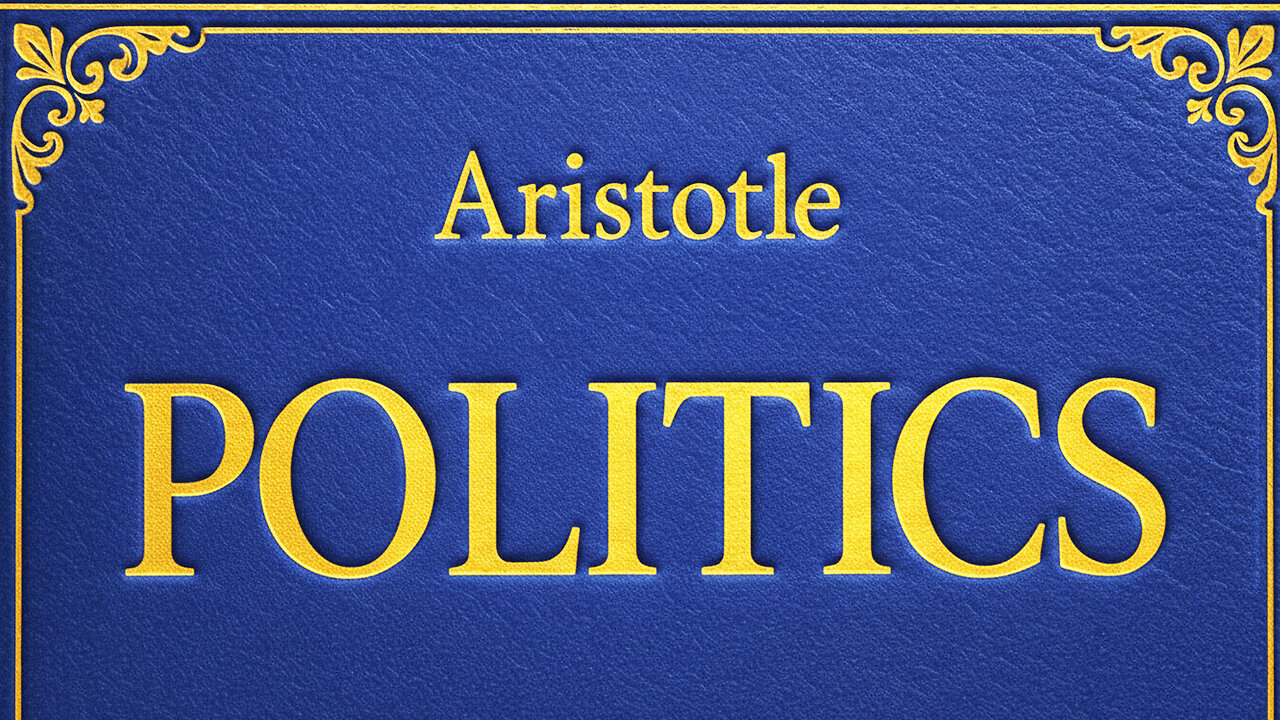Premium Only Content

Politics by Aristotle
Aristotle’s Politics is one of the most important works of political philosophy ever written.
0:00 Book 1. The Household and the Origin of the City
1:01:26 Book 2. Critique of Constitutions and Ideal States
2:37:10 Book 3. Citizenship and Forms of Government
4:11:13 Book 4. The Varieties of Constitutions
5:39:21 Book 5. Causes of Revolution and Preservation of States
7:23:55 Book 6. Democracy and Oligarchy in Practice
8:05:16 Book 7. The Best Life and the Ideal State
9:35:21 Book 8. Education in the Ideal State
This translation by Benjamin Jowett (1817–1893), a renowned English classicist and Master of Balliol College, Oxford, has long been admired for its clarity and faithfulness to Aristotle’s thought. Jowett’s translations of Plato and Aristotle introduced generations of English readers to the depth of Greek philosophy, and his version of Politics remains widely read and respected.
The Politics is divided into eight books, each addressing a distinct aspect of political life: the origins of the state, the analysis of constitutions, the duties of citizenship, the causes of revolution, and the role of education in shaping the best life for both individuals and communities. Aristotle compares actual Greek city-states with theoretical ideals, offering both practical observations and philosophical insights.
Composed in the 4th century BCE, it remains a foundational text for the study of government, ethics, and human society. In this work, Aristotle explores the nature of the city (polis), the role of the household as its foundation, and the ways in which human beings, by their nature, live in communities governed by laws and customs. His reflections continue to shape modern debates about politics, justice, freedom, and the common good.
The Politics complements Aristotle’s Nicomachean Ethics, where he explores the good life for the individual. Together, these works form a vision of ethics and politics as inseparable: the flourishing of the community depends on the flourishing of its citizens, and the purpose of political life is to cultivate virtue and justice. Aristotle analyzes not only monarchy, aristocracy, and democracy, but also corrupt forms such as tyranny and oligarchy, offering one of the earliest systematic classifications of governments.
For over two thousand years, Aristotle’s Politics has influenced philosophers, theologians, statesmen, and political theorists. From medieval scholasticism to the Enlightenment, and into modern discussions of democracy and the rule of law, Aristotle’s ideas have remained central. His recognition that political life is both natural and necessary continues to inspire reflection on the responsibilities of citizens and leaders alike.
© 2025. José Peña Coto. All rights reserved.
-
 LIVE
LIVE
The White House
3 hours agoPress Briefing by Press Secretary Karoline Leavitt, Jan. 20, 2026
1,713 watching -
 56:04
56:04
Timcast
1 hour agoTRUMP DOUBLES DOWN, "NO GOING BACK" On Greenland Takeover
50.9K40 -
 1:57:49
1:57:49
Steven Crowder
4 hours agoStraight to Jail: The Trump Admin Vows to Prosecute Minnesota Ice Protesters
370K224 -
 LIVE
LIVE
Sean Unpaved
2 hours agoCurt Cignetti & Indiana Complete Undefeated Season & Win National Championship! | UNPAVED
591 watching -
 LIVE
LIVE
Side Scrollers Podcast
3 hours agoSide Scrollers Podcast Live | Tuesday January 20th 2026
621 watching -
 LIVE
LIVE
Nikko Ortiz
2 hours agoAmerica Under Attack... | Rumble LIVE
197 watching -
 LIVE
LIVE
Wendy Bell Radio
5 hours agoOh, the Irony.
6,230 watching -
 58:44
58:44
The Rubin Report
2 hours ago‘Shark Tank’ Legend Explains the Real Reason Gavin Newsom’s 2028 Chances Just Died
37.1K34 -
 LIVE
LIVE
Viss
2 hours ago🔴(LIVE) - AMASSING THE LARGEST WEAPONS STOCKPILE EVER | ARC RAIDERS
167 watching -
 LIVE
LIVE
SilverFox
14 hours ago🔴LIVE - TEABAG TUESDAY - ARC RAIDERS
57 watching